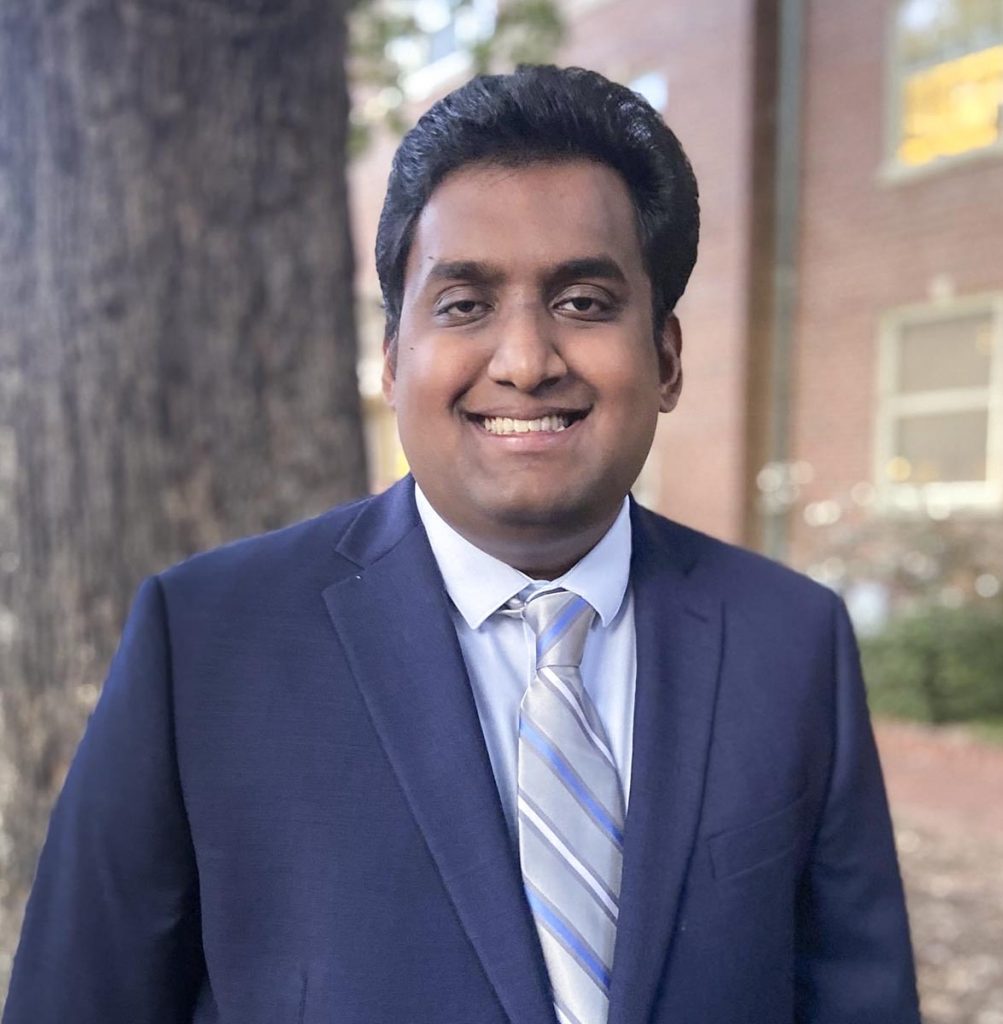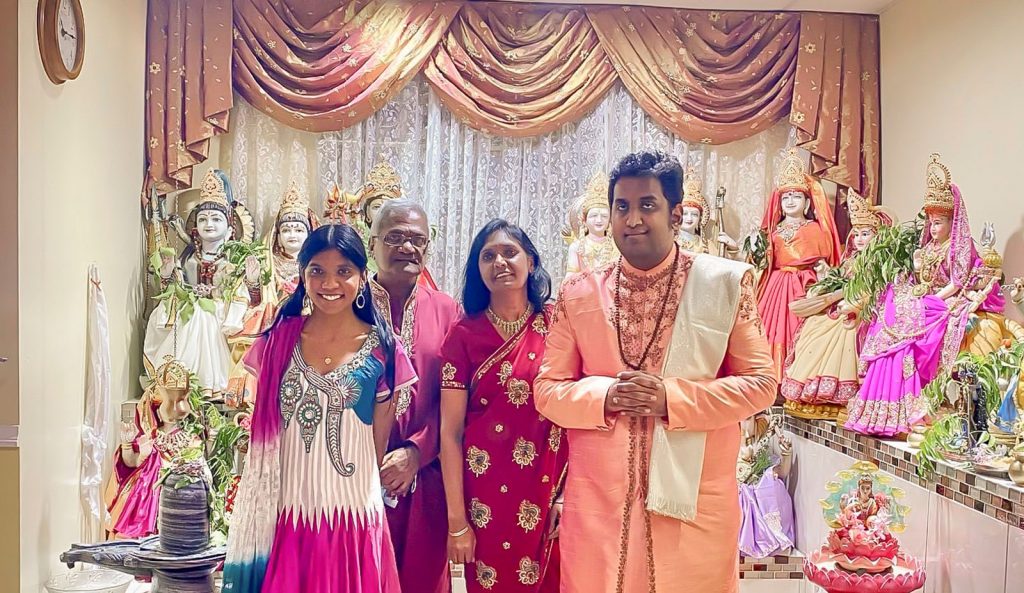How I found diverse ways to deepen my religious life during my university days
By Dhanesh Rishi Budhram
I am a first-generation hindu-american whose parents are from Guyana. My earlier ancestors left multiple parts of South Asia, including Uttar Pradesh, Bengal and Nepal, to work as indentured servants in the sugar cane fields in the Caribbean area for the British Empire after slavery was abolished. They brought their traditions with them to their new land and developed their form of Hinduism, which I cherish.

My parents immigrated to Miami, Florida, in the late 1980s and early 1990s. They were founding members of the Miami Lakshmi Narayan Mandir, the city’s first Hindu organization. I was very involved with the mandir as I grew up. I helped with the pujas and was an active part of their Bal Vihar, or youth group. I also played instruments such as the dholak, tabla and dhantal. During my time at Bal Vihar, I learned a lot about Sanskrit, Hindi, yoga, Hindu philosophy and Hindu scriptures.
I graduated high school in 2014 and began college at the University of North Carolina at Chapel Hill in the fall—an environment where my expression of faith was often belittled. My faith, the teachings of the scriptures and the understanding of rituals outside of the temple served as a great coping mechanism and helped frame me into the person I am today. Here I present my university experiences to explore how young Hindus in college can retain their cultures and religious identities without fear of becoming socially isolated.
As a Hindu, one of the first challenges I faced was not eating beef, pork or other types of red meat that were regularly available to students in the dining halls and through outside dining options. I was dependent on the on-campus dining halls for my meals. There were times where I did not have proper access to vegetarian foods and would have to eat pizza and french fries as a meal. I could not afford to eat out or to have food delivered to my dorm room regularly.
As a first-year student new to UNC and the North Carolina community, I did not know many people on campus. I did not have a vehicle, and the temples in the area were far away. There were times where I felt like I was the only Indo-Caribbean Hindu student on campus. I began to listen to pujas and khatas on YouTube and the radio.
During my time in college, I had some problems focusing on my classwork, and I became burnt out by the rigors of student life. In the summer of 2017, three years after I started college, my parents decided to have my upanaya sanskaar. I could not have it earlier in my life due to the multiple passings of family members year after year. It was then that I became initiated by my guru, Swami Chidghanand Parivrajak of the International Brahmrishi Mission based in India, and received my guru mantra. From that experience, I felt greater as a Hindu since I began to meditate regularly and have a better understanding of Hinduism through my guru’s teachings. I felt like I was a part of something.
Late in my semester, I learned about a student club named Hindu Yuva that was a chapter of the national Hindu Youth for Unity, Virtues and Action and began to participate in their programs on campus. Sometimes, I was the only member present at meetings along with some of the executive board members. I enjoyed the meetings because I learned about the diversity of Hindu practices, such as the South Indian traditions. The students would discuss their favorite shlokas or a guest speaker would speak about a certain topic such as a festival. In Hindu Yuva at UNC, when celebrating a Hindu holiday, the students would organize a small puja. This happened about twice a semester.
However, over the years, I noticed that the group became more of a social club and less of a religious club. Because of our busy college schedules with exams and other assignments, some students did not attend meetings regularly. Some students who did attend seemed to be disinterested in observing holidays and were more interested in other topics on campus. Many college students, regardless of religious preference, are not very religious while in school. There were times when I received funny looks because of wearing a kurta on campus or some students would laugh if I told them I was a Hindu priest in Miami.
Occasionally, I felt like even the leadership on campus was not respectful of my Hindu traditions. There was a visiting lecturer who became a part of Hindu Yuva and she presented Hinduism as more of a spiritual path instead of a ritualistic path. After speaking to them, I felt belittled—like my rituals did not matter. There was a time when I wanted to do a simple Durga puja on campus. I prepared a Power Point presentation about Navaratri and what Mother Durga represents in Hinduism. I prepared everything to perform the puja. When everyone came and I began the puja, this lecturer began to talk over me and skip many of the slides and points that I organized. I felt embarrassed. After she finished, she simply had everyone partake in prasadam and ended the puja portion of the event. One of the parents of a student walked up to me and asked me if I was going to do arati. At that point, I went with her, and we began to do arati together. When everyone else saw us performing arati, they left what they were doing and joined us.
Despite the negative circumstances, I met some of my closest friends through Hindu Yuva. They made me feel empowered as a Hindu—that I had a community on campus. I would speak regularly with one friend from Bihar about Hindu holidays and philosophies. Something as simple as texting her “Happy Maha Shivaratri!” made me feel good, because I felt like there was someone who worshiped like me. Another friend’s family was from Calcutta, and her mother was kind enough to prepare meals for me on special occasions. A third close friend, whose family was from Hyderabad, would talk to me about her South Indian heritage and how it differed from many of the North Indian traditions that informed my Indo-Caribbean traditions. She taught me about different South Indian Hindu festivals such as Ugadi. These friends were gracious enough to take me to the mandirs in the area, including the Hindu Society of North Carolina for their Satyanarayana Vrat Khata or Ganesh Chaturthi puja and the Sri Venkateshwara Mandir for their Diwali puja.
In addition to the Hindu friends I made, I taught myself to become more well-versed in describing Hindu traditions to non-Hindus. At a college campus where there were many devout Christians, Muslims and followers of other religions, I wanted to be able to properly describe my faith and traditions in the same way that other students spoke about their faiths. For example, some of my friends who were non-Hindus would ask me about the Hindu concept of the afterlife to compare to their faith. It made me feel stronger as a Hindu that I could speak to them about the concept of karma and reincarnation, and I could quote scriptures such as from chapter two of the Shrimad Bhagavad Gita.
By wanting to learn more about Hinduism to converse with my friends, I began to fill in the gaps of my knowledge and expose myself to greater knowledge. Before college, I was not aware of the concept of different paramparas, or guru traditions. It was not until I learned about Srila Prabhupada, Swami Chinmayananda or Visvatma Bawra Ji Maharaj that I realized that there were so many different commentaries and ideas expressed by different Hindu reformers.
To make my space into my personal worshiping space, I set up my altar with murtis so I could do the pujas in my room. I also kept copies of the Shrimad Bhagavad Gita and the Ramcharitimanasa to read. I brought a few kurtas with me so I could dress for observances or when attending religious functions. Furthermore, I made social media postings about Hindu holidays and created an online community. I explained my Hindu traditions to my roommates, so they were aware of what I was doing.
As a student, I was a biology major with chemistry and Spanish minors. My dream is to become an orthopedic surgeon. I took two elective religious studies classes at UNC that left a profound impact on me. In my second year, I took a Survey of South Asian Cultural History class where I received a great overview of the different religions and social history of South Asia. The professor I had was a scholar of Ramlila and there were many times I spoke to her fondly about being a Guyanese Hindu. In my fourth year, I took a course about the history of Indian classical dance forms. I learned a kuchipudi dance piece that was very difficult for me. However, that professor was very patient and helpful to me. She was also someone who encouraged me to learn more about Hinduism from a scholarly view. Both instructors made me feel like I mattered as a Caribbean Hindu or a diaspora Hindu, because I had never known about Hinduism in a scholarly approach. They did not consider me as just a “pre-med” student but were both there for me as counselors when I spoke to them about being away from home or my struggles of being a Hindu on campus. I did not have any other professional personnel on campus that I felt comfortable speaking to about being Hindu, other than my professors. I felt like they made me into a scholar of religious studies through the way they spoke to me and taught me about academic writing. I did not know about the difference between being a practitioner of faith versus a scholar of faith. Learning about Hinduism through that lens taught me about how the outsider perspective of a scholar leaves a different impression for a practicing Hindu.
I am currently a remote graduate student at the University of Florida pursuing my master’s degree in medical pharmacology and physiology. My experiences of being Hindu in college motivated me to continue doing more to expound Hinduism. I serve my community as a volunteer priest at the Devi Bhavan Mandir in Miami, Florida. I began an independent research study about the Satyanarayana Vrat Katha and Hanuman puja in Guyana with a professor of religious studies at Florida International University. I attended the 2020 WAVES Hindu Student’s Council conference, where I presented my research about how the Shri Ramcharitimanasa influenced Hinduism in Guyana. In March 2021, I became an intern for the Vishwa Hindu Parishad’s HinduPACT, an advocacy initiative.
I sincerely hope that sharing about being Hindu on campus will serve as motivation for future Hindu students to not give up on their dharma or heritage.
About the Author
Dhanesh Rishi Budhram is a master’s student in medicine currently working as a science and math tutor who aspires to become an orthopedic surgeon. Apart from being a volunteer priest, he enjoys playing dholak, tabla, and spending time with his dog Tyson, peacocks and peahens at his home in Miami, Florida. E-mail: drbudhram1995@gmail.com.
